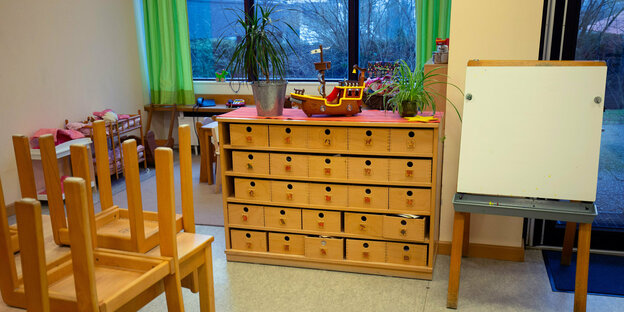The consequences of the coronavirus pandemic are still felt to this day in the social sector. Caritas calls for a vocal review of the practice.

Childcare closures during the pandemic have presented families with great challenges Photo: Friso Gentsch/dpa
SEDAN taz | The German Caritas Association calls for a constructive and critical review of Corona. A public contest to see who can find the most errors is not helpful, the Catholic Welfare Association said. Rather, Caritas President Eva Maria Welskop-Deffaa, remembering the pandemic, advises looking at the strengths that have developed from work in practice. The coronavirus period was an “incredibly profound turning point,” Welskop-Deffaa said Wednesday. Therefore, it is not surprising that she now raises the question of how we can learn from it.
The public debate on how to deal with the pandemic recently gained momentum again after protocols partially drafted by the Robert Koch Institute (RKI) crisis team were made public. Welskop-Deffaa is fundamentally open to a commission of inquiry like the one demanded by the FDP ranks. However, it would be fatal if such a commission were made up solely of scientists. “Overall responsibility and overall crisis management are due to the interaction between science and practice,” he emphasized. Therefore, the association asks that the voices of the practice be included from the beginning and not only selectively through hearings.
Children and young people are abandoned
Meanwhile, the consequences of the pandemic are still being felt today in social institutions. Caritas reports increased levels of illness and extreme burnout among staff. Gundekar Fürsich, CEO of the company St. Elisabeth, which supports Caritas in Erfurt, notes that the nursing labor market is narrowing due to the pandemic. “Some employees have not only left Caritas, but also the care sector as a whole,” says Fürsich.
According to Cáritas, the concerns of children and young people in particular have been too neglected during the pandemic. Psychological problems are said to have doubled in this group. According to the association, homeschooling, daycare and school closures in particular have been a strain. “Even families who are otherwise well-positioned, have a good network and sufficient resources have reached their limit,” says Monika Kießig, director of the St. Josef children and youth center in Berlin-Neukölln. For those who did not have these resources, the situation was even more difficult. She spoke of “an entire generation of children who have been forgotten.” According to Kießig, solid networks that can be activated in times of crisis, also within institutions, are important for the future.
No savings in the social sector
In general, buffer capacities are needed in social institutions and services to be better prepared for future crises, emphasized Caritas President Welskop-Deffaa. A sustainable and reliable social infrastructure is needed that is not only sufficient for normal situations, but also allows flexible reactions in crisis situations. That is why he also urges not to cut the social sector in the federal budget.
